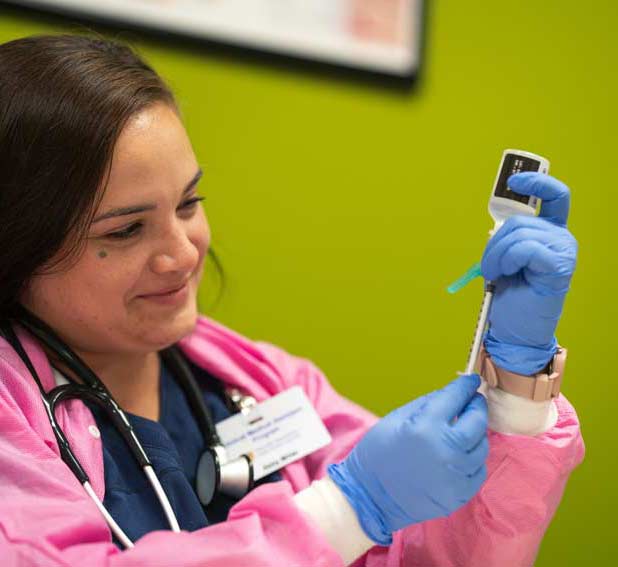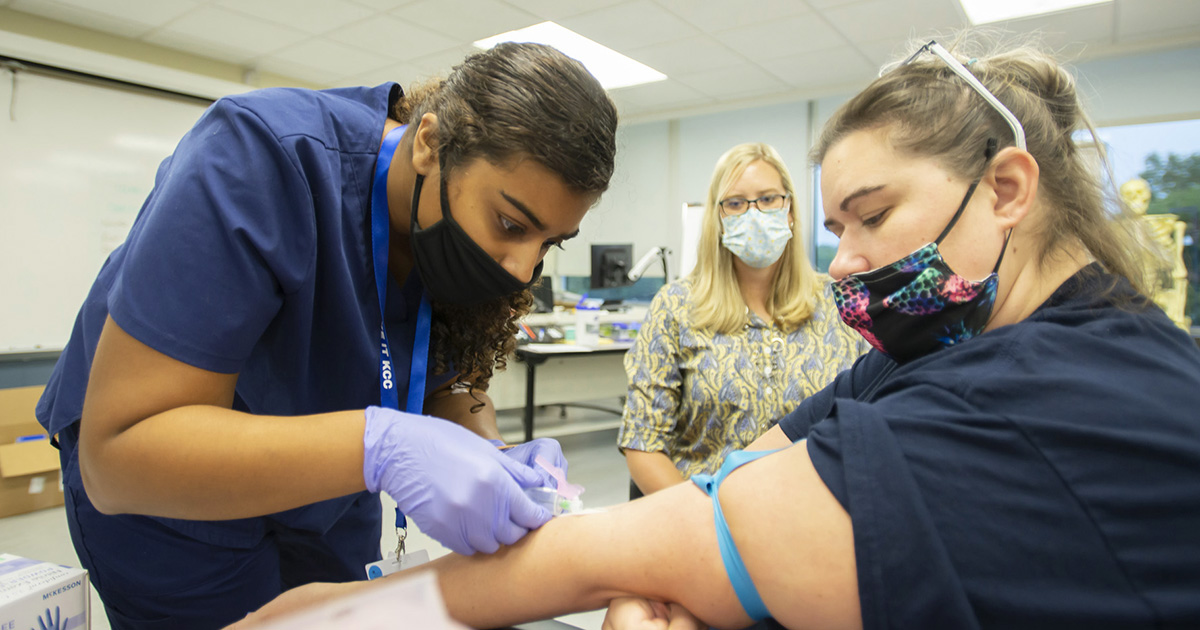Phlebotomy school: Career Pathways
Phlebotomy school: Career Pathways
Blog Article
The Path to Qualification: Understanding the Phlebotomy Training Program Trip and Its Relevance
As you consider the path to certification in phlebotomy, it is essential to comprehend the duty you'll play in medical care. Your training will cover important skills, from blood collection techniques to patient interaction. Each component of the program prepares you for the challenges ahead. But what precisely does the journey entail, and why is certification so essential for your future profession? Allow's check out these concerns even more.

The Role of Phlebotomists in Medical Care
Phlebotomists play a vital role in the medical care system, functioning as the important web link between people and vital diagnostic screening. You'll perform blood attracts, guaranteeing examples are collected properly and safely. Your expertise assists in diagnosing medical problems, keeping an eye on health, and assisting therapy decisions.
In your day-to-day interactions, you'll require to develop count on with people, making them feel comfy throughout what could be a demanding experience. You're responsible for identifying and handling samples meticulously to avoid contamination or mistakes, which can affect examination outcomes.
Yet, you'll typically function alongside physicians and registered nurses, communicating vital details concerning clients' conditions. Your duty is basic in maintaining the workflow in health care setups, making certain timely and accurate results. By grasping your abilities, you add meaningfully to patient care, making you a vital component of the clinical group. Welcoming this responsibility is key to your success as a phlebotomist.
Review of Phlebotomy Training Programs
When exploring phlebotomy training programs, you'll find various types designed to fit various schedules and learning styles. Each program aids you develop important skills like blood collection and client interaction. Comprehending these choices is essential to picking the appropriate course for your job.
Kinds of Educating Programs
Numerous types of training programs are offered for those looking to become skillful in phlebotomy. Additionally, some health centers and centers supply on-the-job training programs, offering functional experience while you learn. Whatever path you pick, each program intends to equip you with the needed abilities for a successful phlebotomy occupation.

Key Skills Established
Grasping phlebotomy needs a set of key abilities that are created with extensive training programs. Additionally, communication abilities are essential; you'll need to interact with people, describe procedures, and placed them at simplicity. Each of these skills is crucial for your success as a licensed phlebotomist, making you an important asset in any kind of healthcare setup.
Secret Elements of a Phlebotomy Program
In a phlebotomy training course, you'll focus on essential subjects that lay the groundwork for your future occupation. You'll participate in hands-on training that allows you to use what you've learned in real-world setups. Both the core curriculum and functional experience are vital for your success as a phlebotomist.
Core Educational Program Overview
While going after a phlebotomy training course, you'll come across a core curriculum created to equip you with basic skills and understanding. Phlebotomy Classes Near Me. This curriculum generally consists of makeup and physiology, focusing on the blood circulation system and understanding blood parts. You'll also find out about various sorts of blood collection techniques, including venipuncture and capillary leak methods
In addition, infection control and safety and security procedures are necessary elements, ensuring you know how to keep a clean and sterile atmosphere. You'll examine patient interaction, emphasizing interaction and compassion, which are essential for alleviating individual anxiousness.
Hands-On Training Experience
Obtaining hands-on experience is an essential component of your phlebotomy training course. This sensible training enables you to apply what you've learned in a real-world setting, boosting your skills and self-confidence. Phlebotomy Classes Near Me.
In addition, you'll get the opportunity to communicate with patients, which is crucial for establishing your communication abilities. This mix of technical effectiveness and interpersonal abilities is critical for your success as a licensed phlebotomist. Inevitably, hands-on training is where theory satisfies technique, solidifying your knowledge and readiness for certification.
Qualification and Licensing Demands
Prior to you can start your occupation in phlebotomy, it is vital to Click This Link comprehend the qualification and licensing demands that differ by state. Many states call for phlebotomists to hold a certification from an acknowledged company, such as the National Phlebotomy Association or the American Culture for Professional Pathology. These accreditations generally entail passing a test that evaluates your expertise and skills in the area.
In enhancement to accreditation, some states have details licensing needs. You may need to finish a certain number of hours in medical method, submit evidence of training, or undertake a history check. It is necessary to research your state's policies to make certain you satisfy all essential criteria.
Staying educated about these demands not just assists you protect a placement yet likewise boosts your reliability as a professional. By fulfilling these demands, you'll be well on your means to an effective occupation in phlebotomy.
Hands-On Training and Practical Experience
Hands-on training and functional experience are crucial parts of your phlebotomy education and learning, as they enable you to apply academic expertise in real-world circumstances. During your training, you'll participate in supervised venipuncture, find out appropriate strategies, and end up being familiar with numerous blood collection tools. This direct involvement is crucial for constructing your confidence and developing your skills.
You'll function carefully with experienced specialists that can lead you with the nuances of patient interaction and sample handling. Each practice not just strengthens your understanding but additionally prepares you for the hectic environment of medical care Get the facts settings.
In addition, lots of programs incorporate professional rotations, permitting you to experience diverse setups, from hospitals to outpatient centers. This exposure assists you adjust to different obstacles and individual needs, ensuring you're well-prepared for your future duty. Accept these possibilities, as they're important to becoming a competent and caring phlebotomist.
Obstacles Dealt With Throughout Training
While gaining hands-on experience is vital, it's crucial to recognize the challenges that can occur throughout your phlebotomy training. Furthermore, understanding the skills required for blood draws takes practice; you may have a hard time with method at first.
Time monitoring can additionally be a difficulty, as harmonizing theory, practical sessions, and personal commitments can feel intimidating. You may face varying learning paces among your peers, resulting in feelings of self-doubt if you think you're falling back. Adjusting to the different characters of trainers can be difficult, as each may have a distinct teaching style.
Recognizing these obstacles early on can prepare you for success and aid you create strength throughout your training trip.
Job Opportunities After Qualification

As you gain experience, you could even take into consideration specializing in locations like pediatric or senior citizen phlebotomy, dealing with details person requirements. Some phlebotomists pick to advance their occupations by becoming lab my sources technicians or going after more education in health care areas.
Additionally, your accreditation can lead to functions in training or overseeing new phlebotomists, permitting you to share your knowledge. With the health care market consistently growing, your skills will constantly remain in demand, leading the way for a secure and meeting career. Accept the chances awaiting you!
Frequently Asked Questions
What Is the Common Period of a Phlebotomy Educating Training Course?
Phlebotomy training programs generally last around four to eight weeks. You'll participate in hands-on technique, class guideline, and on-line learning. Completing this training prepares you for accreditation and a satisfying job in medical care.
Are Online Phlebotomy Courses Available?
Yes, on-line phlebotomy courses are available. They offer flexibility and convenience, allowing you to study at your own pace. Just verify the program is accredited to meet certification requirements and gain valuable abilities for your job.
Just How Much Does Phlebotomy Training Typically Price?
Phlebotomy training commonly sets you back in between $700 and $2,500, relying on the program and place. You ought to think about aspects like program length, consisted of products, and hands-on experience when picking the appropriate training for you.
What Prevail Requirements for Phlebotomy Training?
Typical prerequisites for phlebotomy training usually consist of a high school diploma or GED, booster shots, and a history check. Some programs may additionally require standard health care knowledge or qualifications, guaranteeing you're prepared for hands-on training.
Can I Work While Completing My Phlebotomy Training?
Yes, you can work while finishing your phlebotomy training. Lots of students equilibrium tasks with their researches, however make sure to manage your time properly to guarantee you fulfill both work and training commitments efficiently.
Report this page